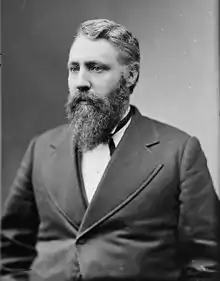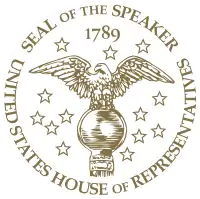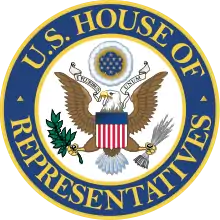J. Warren Keifer
Joseph Warren Keifer (January 30, 1836 – April 22, 1932) was a major general during the Spanish–American War and a prominent U.S. politician during the 1880s. He served in the United States House of Representatives as a Republican from Ohio from 1877 to 1885 and from 1905 to 1911. From 1881 to 1883 he was Speaker of the House.
Joseph Warren Keifer | |
|---|---|
 | |
| 30th Speaker of the United States House of Representatives | |
| In office December 5, 1881 – March 3, 1883 | |
| Preceded by | Samuel J. Randall |
| Succeeded by | John G. Carlisle |
| Member of the U.S. House of Representatives from Ohio | |
| In office March 4, 1877 – March 3, 1879 | |
| Preceded by | William Lawrence |
| Succeeded by | Ebenezer B. Finley |
| Constituency | 8th district |
| In office March 4, 1879 – March 3, 1881 | |
| Preceded by | John A. McMahon |
| Succeeded by | Emanuel Shultz |
| Constituency | 4th district |
| In office March 4, 1881 – March 3, 1885 | |
| Preceded by | Ebenezer B. Finley |
| Succeeded by | John Little |
| Constituency | 8th district |
| In office March 4, 1905 – March 3, 1911 | |
| Preceded by | Thomas B. Kyle |
| Succeeded by | James D. Post |
| Constituency | 7th district |
| Personal details | |
| Born | January 30, 1836 Bethel Township, Clark County, Ohio |
| Died | April 22, 1932 (aged 96) Springfield, Ohio |
| Political party | Republican |
| Alma mater | Antioch College |
| Profession | Law |
| Signature | |
| Military service | |
| Branch/service | United States Army Union Army |
| Years of service | 1861–1865, 1898–1899 |
| Rank | |
| Unit | 3rd Ohio Infantry Regiment |
| Commands | 110th Ohio Infantry Regiment 2nd Brigade, 3rd Division, VI Corps 7th Army Corps (1898–1899) |
| Battles/wars | American Civil War Spanish–American War |
Early life
Keifer was born in Clark County, Ohio. He attended school at Antioch College then returned to his family's farm. While working as a farmer he devoted his spare time to studying law. He began his law practice in Springfield, Ohio on January 12, 1858.
Civil War
He enlisted in the 3rd Ohio Infantry, a three-months regiment, being appointed major. He served in western Virginia fighting in the battles of Rich Mountain and Cheat Mountain and afterward was promoted to lieutenant colonel of the regiment. When his term expired, he joined the 110th Ohio Infantry and became its colonel. He served in the Eastern Theater leading his regiment at the second battle of Winchester. While the Union army was soundly defeated and most of it surrendered, Keifer's regiment was able to avoid capture. Following the battle of Gettysburg, Keifer was assigned to brigade command in the III Corps and fought at the battle of Wapping Heights. After Robert E. Lee's army had retreated to safety in Virginia, Keifer and his regiment were dispatched to New York City to help suppress the draft riots.
Keifer returned to the Army of the Potomac in time for the Overland Campaign. He was wounded in the arm at the battle of the Wilderness, putting him out of action for a time. When he did return to active duty he was placed in command of the 2nd Brigade in James B. Ricketts's 3rd Division of the VI Corps. He led his brigade at the battles of Winchester and Fisher's Hill. During the battle of Cedar Creek, VI Corps commander Horatio G. Wright temporarily commanded the Army of the Shenandoah and Ricketts temporarily in command of the corps. This put Keifer in command of the 3rd Division in Ricketts's absence. When Philip H. Sheridan heroically returned to command the army in the midst of the battle, returning Wright to corps command, Ricketts had already been wounded leaving Keifer in command of the division for the rest of the battle. For his service during the Shenandoah Valley Campaign, on December 12, 1864, President Abraham Lincoln nominated Keifer for appointment to the grade of brevet brigadier general of volunteers, to rank from October 19, 1864, and the United States Senate confirmed the appointment on February 14, 1865.[1]
When the VI Corps returned to the Army of the Potomac General Truman Seymour was placed in command of the 3rd Division and Keifer returned to command the 2nd Brigade, taking part in the breakthrough at Petersburg and the Appomattox Campaign. Keifer was beveted as a major general, to rank from April 9, 1865, in recognition of his contributions to the campaign.
Political career
Following the Civil War, Keifer returned to Springfield and resumed his law practice. From 1873 until his death, he served as a trustee of Antioch College. In 1876 he was a delegate to the Republican National Convention and the next year went to Congress. From 1881 to 1883 during the 47th United States Congress, Keifer served as the 47th Speaker of the House of Representatives.
Spanish–American War
During the Spanish–American War, President William McKinley appointed Keifer major general of volunteers on June 9, 1898. He commanded the 7th Army Corps and the American forces that marched into Havana after Spanish forces withdrew on Jan. 1, 1899.[2]
Return to Politics
After returning to private life on May 12, 1899, he published Slavery and Four Years of War, in 1900. The book was both a commentary on the history of slavery in the United States as well as an autobiography of his experiences during the Civil War. He served as the first commander in chief of the United Spanish War Veterans from 1900 to 1901 and in 1903 and 1904 as the Ohio commander of the Loyal Legion.[3]
.jpg.webp)
He again ran and was elected to Congress and served from March 4, 1905 – March 3, 1911.
Later life
After his political career, Keifer again resumed his law practice and served as the president of the Lagonda National Bank in Springfield, Ohio. He died April 22, 1932 at the age of 96 in Springfield, and is buried in Springfield's Ferncliff Cemetery.
See also
| Wikimedia Commons has media related to J. Warren Keifer. |
References
- Eicher, John H., and David J. Eicher, Civil War High Commands. Stanford: Stanford University Press, 2001. ISBN 978-0-8047-3641-1. p. 749.
- "Joseph Warren Keifer Biography". Ohio Judicial Center. Archived from the original on 21 July 2011. Retrieved 6 September 2010.
- "KEIFER, Joseph Warren - Biographical Information". United States Congress. Retrieved 6 September 2010.
Further reading
- Keifer, J. Warren (1900). Slavery and four years of war: A political history of slavery in the United States, together with a narrative of the campaigns and battles of the Civil War in which the author took part. New York: G. P. Putnam and Sons. ISBN 0-543-66245-4.
joseph warren keifer.
- Pope, Thomas E. The Weary Boys: Colonel J. Warren Keifer and the 110th Ohio Volunteer Infantry. Kent State University Press, 2002. ISBN 0-87338-729-5.
- Reid, Whitelaw (1895). "Joseph Warren Keifer". Ohio in the War Her Statesmen Generals and Soldiers. 1. Cincinnati: The Robert Clarke Company. pp. 858–860.
External links
- United States Congress. "Keifer, Joseph Warren (id: K000048)". Biographical Directory of the United States Congress. Retrieved on 2008-12-15
- Library of Congress profile
- Works by J. Warren Keifer at Project Gutenberg
- Works by or about J. Warren Keifer at Internet Archive
- J. Warren Keifer at Find a Grave

